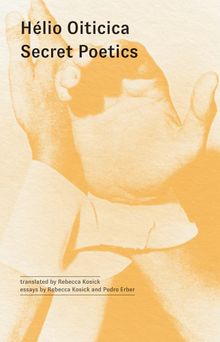| |||||||||||||||||||||||||
ARTIST MONOGRAPHS
|
|
STATUS: Out of stock Temporarily out of stock pending additional inventory. |
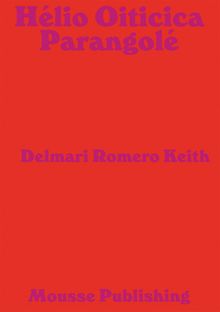 Hélio Oiticica: Parangolé
Hélio Oiticica: Parangolé
Published by Mousse Publishing.
Foreword by Marc Pottier. Text by Delmari Romero Keith.
This book offers an examination of the iconic Parangolés, or capes, used by Brazilian performance artist Hélio Oiticica (1937–1980). Reflecting residual memory from the Brazilian favelas and carnival, the Parangolés are manifestations of ancestral rituals and the rhythms of the body and nature.
PUBLISHER
Mousse Publishing
BOOK FORMAT
Paperback, 6.5 x 9.25 in. / 208 pgs / 18 color / 58 bw.
PUBLISHING STATUS
Pub Date 10/3/2023
Active
DISTRIBUTION
D.A.P. Exclusive
Catalog: FALL 2023 p. 165
PRODUCT DETAILS
ISBN 9788867495658 TRADE
List Price: $30.00 CAD $43.50
AVAILABILITY
In stock
in stock $30.00 Free Shipping UPS GROUND IN THE CONTINENTAL U.S. |
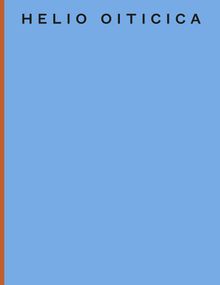 Hélio Oiticica
Hélio Oiticica
Published by Lisson Gallery.
Text by Lynn Zelevansky, Cesar Oiticica Filho.
Brazilian artist Hélio Oiticica’s (1937–80) oeuvre remains an indisputable influence on all aspects of avant-garde culture in his home country and abroad, from visual art to music, theater, literature and beyond. This volume demonstrates the numerous ways in which Oiticica’s work explored and expanded formal artistic modes, pushing past the boundaries of color and structure. Oiticica prioritized the inclusive and participatory possibilities of art, represented through his forays into environmental art and interactive installation. Large-scale projects such as his monumental installation Tropicália (1966–67), which satirizes the idea of Brazil as a tropical paradise, are documented alongside his works on paper and textile pieces. The text traces the evolution of Oiticica’s multidisciplinary practice and underlines the cosmological ideas that guided his approach to art and life, demonstrating the profound impact Oiticica's ideas had on the wider art world, both past and present.
PUBLISHER
Lisson Gallery
BOOK FORMAT
Clth, 9.5 x 12 in. / 96 pgs / 57 color.
PUBLISHING STATUS
Pub Date 8/31/2021
Active
DISTRIBUTION
D.A.P. Exclusive
Catalog: FALL 2021 p. 118
PRODUCT DETAILS
ISBN 9780947830809 TRADE
List Price: $59.95 CAD $81.95 GBP £45.00
AVAILABILITY
In stock
in stock $59.95 Free Shipping UPS GROUND IN THE CONTINENTAL U.S. |
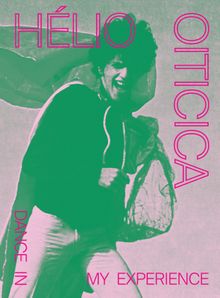 Hélio Oiticica: Dance in My Experience
Hélio Oiticica: Dance in My Experience
Published by Museu de Arte de São Paulo.
Edited with text by Adriano Pedrosa, Tomás Toledo. Text by Adrian Anagnost, Cristina Ricupero, Evan Moffitt, Fernanda Lopes, Fernando Cocchiarale, Sergio Delgado Moya, Tania Rivera, Vivian A. Crockett, Hélio Oiticica.
One of the most radical and joyful artists of the 20th century, Hélio Oiticica (1937-80) helped lead the charge in Brazilian art’s unique transition from abstract concrete art to performative objects and collective performance.
As MoMA’s 2019 exhibition Sur Moderno demonstrated, one of Oiticica’s most revolutionary projects was the Parangolé, wearable sculptures made from fabric, plastic or paper. The Parangolé is meant to be worn, inhabited and danced by a participant, lending a physical spontaneity to the piece that entirely blurs the boundaries between the art object and those who experience it.
Dance in My Experience traces the genealogy of this theme within the artist’s oeuvre, identifying rhythmic, choreographic and dance elements throughout his trajectory, from his first Metaesquemas through the Spatial Reliefs, Nuclei and Bólides, culminating in the Parangolés. It includes texts by Oiticica and contributions by numerous scholars.
PUBLISHER
Museu de Arte de São Paulo
BOOK FORMAT
Hardcover, 8 x 10.75 in. / 328 pgs / 295 color.
PUBLISHING STATUS
Pub Date 10/27/2020
Out of stock indefinitely
DISTRIBUTION
D.A.P. Exclusive
Catalog: FALL 2020 p. 115
PRODUCT DETAILS
ISBN 9788531000850 TRADE
List Price: $60.00 CAD $84.00 GBP £53.00
AVAILABILITY
Not available
STATUS: Out of stock indefinitely. |
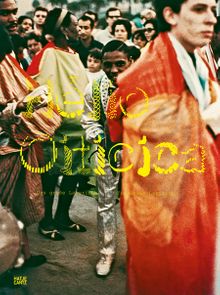 Hélio Oiticica: The Great Labyrinth
Hélio Oiticica: The Great Labyrinth
Published by Hatje Cantz.
Edited by Susanne Gaensheimer, Max Hinderer Cruz. Text by Hélio Oiticica.
PUBLISHER
Hatje Cantz
BOOK FORMAT
Paperback, 7.5 x 10 in. / 336 pgs / 71 color.
PUBLISHING STATUS
Pub Date 2/28/2014
Out of stock indefinitely
DISTRIBUTION
D.A.P. Exclusive
Catalog: SPRING 2014 p. 129
PRODUCT DETAILS
ISBN 9783775737296 TRADE
List Price: $60.00 CAD $79.00
AVAILABILITY
Not available
STATUS: Out of stock indefinitely. |
 Helio Oiticica: Quasi-Cinemas
Helio Oiticica: Quasi-Cinemas
Published by Hatje Cantz.
Edited by Ann Bremner. Essays by Carlos Basualdo, Dan Cameron, Helio Oiticica, Ivana Bentes. Introduction by Sherri Geldin, Udo Kittelmann, and Lisa Phillips.
PUBLISHER
Hatje Cantz
BOOK FORMAT
Paperback, 9 x 12 in. / 176 pgs / 50 color / 50 bw
PUBLISHING STATUS
Pub Date 5/2/2002
Out of print
DISTRIBUTION
D.A.P. Exclusive
Catalog: SPRING 2002
PRODUCT DETAILS
ISBN 9783775710954 TRADE
List Price: $40.00 CAD $50.00
AVAILABILITY
Not available
STATUS: Out of print | 8/10/2005 For assistance locating a copy, please see our list of recommended out of print specialists |
